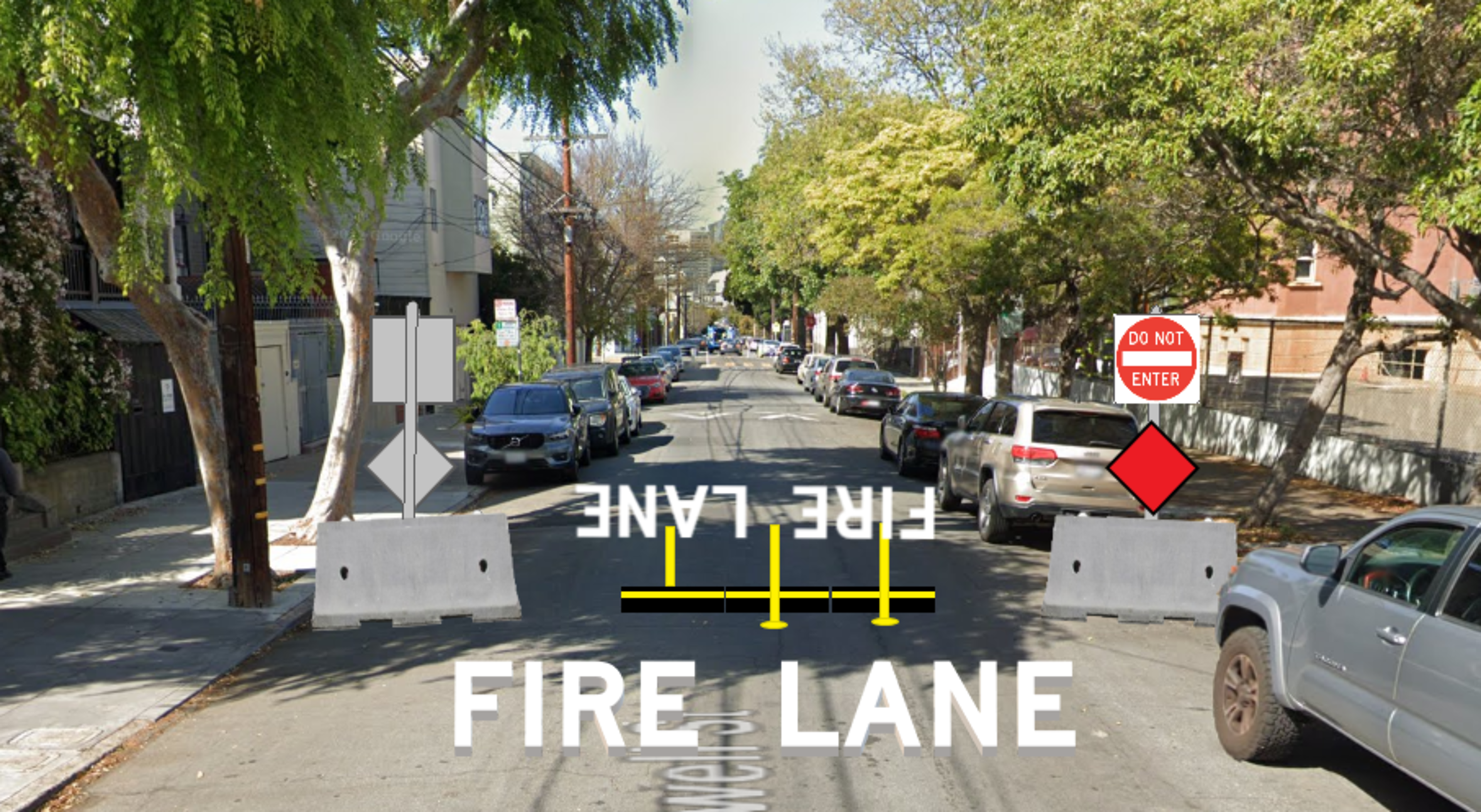Whether he likes it or not, Juan Gallardo’s restaurant at 18th and Shotwell streets has become an unwitting hub for sex workers in San Francisco’s Mission District. Gallardo said he typically spots around 20 sex workers hanging out in front of his Mexican joint, Gallardo’s, when he shows up for work around 3 or 4 a.m. on the weekend. He said he’s had to fish used condoms out of the bushes near the front door and fielded customer complaints about sex workers loitering in the area.
Now, after a lawsuit and months of complaints from locals, the city is doing something about it.
On Tuesday, the San Francisco Municipal Transportation Agency’s board of directors voted to install mid-block barricades along Shotwell Street between 19th and 21st streets. Similar barriers installed last year on Capp Street pushed the activity to Shotwell, leading residents to sue the city over safety concerns.

Like other businesses and residents in the area, Gallardo said he supports adding the barricades but acknowledges what his neighbors fear — they’ll just push the unwanted traffic onto their blocks.
“They’ll probably just move to Folsom. Maybe Harrison,” Gallardo said while sitting in his restaurant Monday.
Some bollards are already in place on 20th near Shotwell, designed to make it harder for johns to cruise along the corridor. Under the board’s plan, the barriers will be in place for 18 months with the option of an extension afterward.

During public comment ahead of the board’s vote Tuesday, opinions on the barricades were mixed. Supporters said they’re needed to curb a rampant sex market on Shotwell, while opponents said they are worried that delivery trucks and other drivers will be blocked in by the barricades and clog the street. Locals say Shotwell is too narrow to make a three-point turn, and in a worst-case scenario, the barricades could prevent first responders from accessing the street.
Still, supporters of the plan said it’s better than nothing.
“Is it perfect? No. Is it what we need right now? Yes,” said Ayman Farahat, the lead plaintiff in the Shotwell residents’ lawsuit against the city. “We need to do something.”
‘They’ll keep moving’
John Bove said the scene on 18th and Shotwell streets is the worst it’s been in the 25 years he’s lived there.
He’s worried that if the city blocks off Shotwell between 19th and 21st streets as planned, more sex workers will get pushed one block north to where he lives.
“It feels like they’re not saying, ‘Here’s our comprehensive solution,’” Bove told The Standard. “It feels like they’re only acting when they feel they have no choice.”

Tom Madonna, owner of Shotwell’s bar at Shotwell and 20th, said johns have used his bar’s parklet to have sex. Madonna said he wants police to crack down with DUI checks and license-plate-reading cameras, saying there’s “no enforcement.”
“You have to target the johns,” Madonna said. “You put a ticket in the mail, and his wife’ll be like, ‘What were you doing on Shotwell at 1 a.m.?’”
Residents on Folsom Street between 20th and 21st, one block from where the barricades are planned for Shotwell, say they’ve been seeing johns and used condoms on their street for years. They worry the barricades will make the spillover worse.

“It’s just gonna move here,” said 20-year-old Carol Garcia, who’s lived at that intersection her whole life. “You can’t really drive on Shotwell, so this area is attractive.”
Trevor Chandler, who is running to replace Supervisor Hillary Ronen to represent the Mission, said he supports the barricades but also wants tougher police enforcement of johns and pimps. The sex workers should be directed to job training and not be criminalized, he said.
“Without consistent enforcement of the johns and pimps, it will continue to move,” Chandler said. “We need real consequences, not letters to johns (opens in new tab) or an online course.”
Another District 9 candidate Jackie Fielder, said she believes sex workers and johns shouldn’t be in residential areas at all. A long-term solution, Fielder said, would be to create a regulated area away from homes where sex work could take place safely.
“Some need a way out, some need to pay the bills or feed families, and some genuinely are in harm’s way, but if your response is just more police, this decades-long issue will never change,” Fielder said in a text Monday.
Ronen did not respond to a request for comment. The supervisor has said sex work should be decriminalized and last year introduced a resolution urging the city to do so.
“When it happens in the shadows, it makes it less safe for everyone,” Ronen told The Standard in 2023.


Maxine Holloway, co-founder of Oakland-based sex worker advocacy group Bay Area Workers Support, called the barricade plan “disappointing” in an emailed statement, saying it’s a short-term fix that will just move sex markets to other streets and make conditions more dangerous for sex workers. She called on officials to work with advocacy groups to come up with better solutions.
“Sex workers deserve safety, dignity, and care and must not be overlooked in policy decisions,” Holloway said. “Until our community members can meet their material needs in other ways, outdoor prostitution will persist.”
San Francisco police declined to comment on the barricades plan but said in an email they have installed surveillance cameras near Shotwell and 21st streets, calling them “strong deterrents.”

“We are doing everything in our power to reduce crime in the city,” a SFPD spokesperson said.
Despite his support for the Shotwell barricades, Farahat admitted they could just move sex markets from block to block. But, he said, it’s important to focus on areas where the sex market is causing problems as he calls on the city to find a more comprehensive solution.
“We can’t let hypotheticals prevent us from addressing what’s definite and present,” Farahat said. “Instead of just asking, ‘Where’s it going to go?,’ what’s the city going to do to stop it from going there after?”
